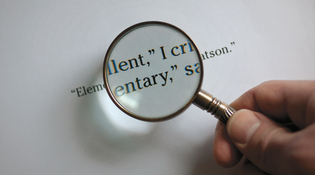 loading
loading
Arts & CultureYou can quote them: Elementary, my dear readerThe quotations and misquotations of Sherlock Holmes. Yale law librarian Fred R. Shapiro is editor of the Yale Book of Quotations.  John Paul ChirdonView full imageAny discussion of the quotations of Sherlock Holmes must begin with the Great Misquotation. Ranking with the famous but erroneous “Beam me up, Scotty” and “Play it again, Sam” is the fictional detective’s fictional catchphrase: “Elementary, my dear Watson.” As many have pointed out, this sequence of words appears nowhere in Arthur Conan Doyle’s four Holmes novels and fifty-six Holmes short stories. The closest approach is in “The Crooked Man,” where sidekick Dr. Watson reports this exchange:
When did the misquotation start? The New Penguin Dictionary of Quotations and other sources attribute it to the 1929 movie The Return of Sherlock Holmes. But that assertion mis-sources the mis-quote. The more accurate Oxford Dictionary of Quotations traces its use further back, to P. G. Wodehouse’s novel Psmith, Journalist (1915). As we have so often seen, however, searchable digital collections of historical texts can trump the traditional quotation dictionaries. For the Yale Book of Quotations, I located “Elementary, my dear Watson” in the New York Times, April 30, 1911. Now, using additional digitized newspapers, I find the following in the Richmond Times Dispatch, August 24, 1909:
Doyle sprinkled his detective stories with many quotational gems of eloquence and penetration. In The Sign of Four, Holmes asked, “How often have I said to you that when you have eliminated the impossible, whatever remains, however improbable, must be the truth?” (The science fiction editor and writer Anthony Boucher adapted this remark in a 1941 novel: “Eliminate the impossible. Then if nothing remains, some part of the ‘impossible’ was possible.”) During an exchange in the story “Silver Blaze,” Holmes utters the definitive comment about absence as evidence. A police detective on a puzzling case asks him, “Is there any point to which you would wish to draw my attention?” This exchange follows:
Sometimes, there are flashes of deeper sentiment, exemplified by this passage in “The Naval Treaty”:
Does God exist, and is God good? Theologians and philosophers have advanced many logical proofs and disproofs, but the most rational of literary creations relied on flowers.
The comment period has expired.
|
|